| Home |
| Acknowledgments |
| Conventions |
| Glossary |
| Maps |
| References |
| Links |
| Articles |
| Thumbnails |
| Species
list |
| Family |
| Next
species |
Additional Photos
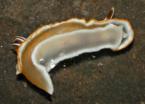
underside
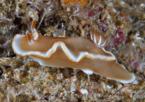
regeneration error
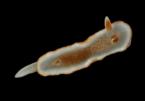
young, 4 mm
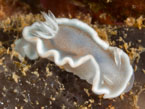
pale
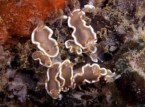
feeding
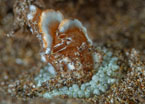
predation
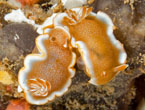
mating

with egg masses
_______________
GALLERY

Glossodoris rufomarginata (Bergh, 1890)
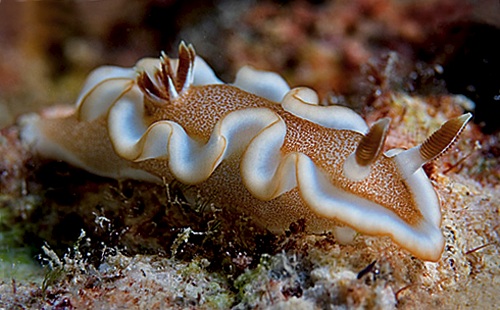
| Maximum size: 25 mm. Identification: This elongate-oval dorid has a white body covered with minute orange-brown flecks giving it the overall appearance of a brown animal. The margin is white, edged with a fine orange or tan line in most individuals. The mantle margin becomes more elaborately folded with increasing age. The rhinophores and gills are light brown, lined with white. Natural history: Glossodoris rufomarginata is one of the most commonly encountered diurnal nudibranchs from < 1 to 64 m (< 3 to 210 ft). It is found on rocky bottoms in protected to highly exposed locations and is particularly common on shaded cliffs. It also occasionally occurs in tide pools. Several animals are often found together on a dark gray sponge, Cacospongia sp., on which it feeds. (Note 1) Its egg masses are white and usually composed of about two whorls. They are typically laid on or near the host sponge. Distribution: Big Island, Maui, Lanai, Molokai, Oahu, Kauai, Niihau, French Frigate Shoals and Gardner Pinnacles: widely distributed in the Indo-Pacific. Taxonomic notes: This species is listed as Chromodoris youngbleuthi in Kay, 1979 and Kay & Young, 1969. It is also listed as Chromolaichma youngbleuthi (Kay & Young, 1969) in Bertsch & Johnson, 1981. The name means "red margin." It's referred to as the "white-margin nudibranch" in Hoover, 1998 & 2006 as well as the "whitemargin sea slug" in Hoover, 1997. It was first reported in Hawaii from Hanauma Bay, Oahu, in May, 1965 (Kay & Young, 1969). Photo: Mike Roberts: Makena, Maui; 2007. Observations and comments: Note 1: The sponge may appear cream when the dusky surface has been eaten away by the nudibranchs. |
| Thumbnails |
Species
list |
Family | Next species | Top |